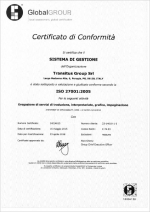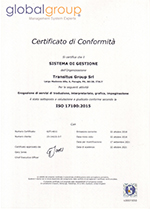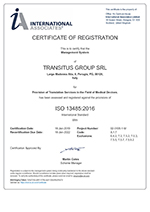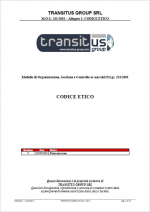Right from the founding of TRW, we have always believed in the importance of officially certifying the validity of our work processes.
Our translation agency also boasts the much-coveted ISO 17100 certification. This certification specifies the requirements of all aspects of the translation process, in order that the supplied service meets the correct quality standards. Everything is regulated in detail, from the professional qualifications and skills of the resources involved to the standards relating to the different stages of production: pre-production, production and post-production.
TRW has also obtained certifications ISO 9001 - Quality management, ISO 14001 - Environmental management systems and ISO 27001 - Information security.

TRW has a quality management system compliant with the requirements of ISO 9001, namely:

Standard UNI CEI ISO /IEC 27001:2005 (Information technology - Security techniques - Information security management systems - Requirements) defines the necessary characteristics to implement and manage an information security system (ISMS, Information Security Management System) and includes aspects relating to logical, physical, and organisational security.

The ISO 17100 quality standard sets out provisions for translation service providers (TSP) in relation to the management of core processes, minimum qualification requirements, the availability and management of resources, as well as necessary actions for the delivery of a quality translation service;
Read allA translation service provider is a person or organisation that provides professional translation services.
The international quality standard ISO 17100:2015 sets out the requirements relating to all aspects of the translation process that directly influence the quality and supply of translation services;
Translation + independent revision (bilingual editing)
Similarly to the previous UNE EN-15038 quality standard, the most important aspect of the ISO 17100 quality standard is the definition of the translation process, wherein translation in its strictest sense is just one part of the process and does not guarantee quality unless a revision is carried out by a second translator. The standard also clearly defines the professional skills of each participant in the translation process, namely translators, revisers and project managers.
The necessary translator skills defined in the ISO 17100 standard include competence in translation, textual and linguistic competence in both the source and target languages, competence in research, in the acquisition of information and its elaboration, cultural competence, technical and sector-based competence.
All ISO 17100:2015 certified translation services must include translation and revision (bilingual editing) as a minimum.
Professional skills of translators and revisers
The quality standard obliges the translation company to work exclusively with translators able to provide documented proof of their conformity with at least one of the following criteria:
Educational qualifications in Translation are referred to differently in various countries; they may be for example, Language studies, Modern languages, etc.
Revisers or bilingual editors, in addition to satisfying one of the three aforementioned criteria, must also have experience in translation or revision in the specialist field in which they revise.

ISO 14001 is recognised as the standard for certification of the Environmental Management System.
Based on the Plan-Do-Check-Act methodology, it provides a systematic framework for the integration of practices designed to protect the environment, prevent pollution, reduce the quantity of waste and the consumption of energy and materials.

TRW is certified pursuant to ISO 13485, that is, internationally recognised certification for quality management systems in the medical devices industry.
All organisations that work in this industry, from design to development, production, installation, and technical assistance for medical devices or related services, are required to adhere to this quality standard. This certification guarantees compliance of the management systems of electromedical equipment, and with the requirements of the related standards.

TRW code of ethics: clear rules to work better.
TRW has adopted a code of ethics since 19th September 2016. It is a set of shared and well-defined rules of conduct, which must be respected by all figures involved in the work processes to ensure best practices in all situations, especially in dealings with large corporations.
Thanks to the code of ethics, each person involved, from the remote translators to the agency executives, can behave in accordance with strict company guidelines, without fear of making mistakes or damaging the client and/or the agency’s image.
We are the first company in Italy to have drawn up this type of regulation, and we are very proud to have made this choice.
What does ethics mean?
Generally speaking, ethics can be considered behaviour guided by the desire to achieve virtuous goals together with others, without taking advantage of anyone. The principles inspiring our code of ethics are: honesty, integrity, transparency, and innovation.
Creating a healthy work relationship is essential in developing fruitful and long-lasting relationships with all, clients and suppliers alike.
We firmly believe that fairness on the part of all is essential in building an ever-stronger corporate identity.